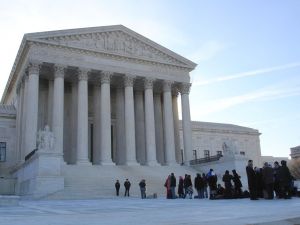 Every year, the Supreme Court receives about 10,000 petitions for writ of certiorari, but only hears about 80 of them. Unlike lower appellate courts, the Supreme Court’s review of a case is not a matter of right, but of judicial discretion. Rule 10 of the Supreme Court’s Rules states that a petition for writ of certiorari will be granted only for compelling reasons. Below are some of the factors the Supreme Court typically considers when deciding what cases to hear:
Every year, the Supreme Court receives about 10,000 petitions for writ of certiorari, but only hears about 80 of them. Unlike lower appellate courts, the Supreme Court’s review of a case is not a matter of right, but of judicial discretion. Rule 10 of the Supreme Court’s Rules states that a petition for writ of certiorari will be granted only for compelling reasons. Below are some of the factors the Supreme Court typically considers when deciding what cases to hear:
- The Court will hear cases to resolve a conflict of law. There are 13 federal circuits and 50 state supreme courts that make up the United States judicial system. Sometimes, a number of these courts reach different conclusions and fall into disharmony about an issue of federal or constitutional law. The Supreme Court then may then resolve the incongruity so that all areas of the country are uniform with respect to that law.
- The Court will hear cases that are of great public importance. Sometimes the Court will consider a highly unusual case which calls for the Supreme Court’s intervention. One example is U.S. v. Nixon which involved the Watergate scandal. Another more recent example is Bush v. Gore arising from the extremely close 2000 presidential election.
- The Court hears cases when lower courts ignore Supreme Court precedent. If a lower court blatantly disregards a past Supreme Court decision, the Court may hear the case to correct the lower court, or the Court might just overrule the case without issuing an opinion.
- The Court will hear cases where an area of law is unsettled. If a state court or a United States court of appeals has decided an important question of federal law that has not been settled by the Supreme Court, the Supreme Court may hear the case to settle the matter.
Petitions for writ of certiorari are rarely granted for any other reasons. It is a common misconception that the Supreme Court will hear a case solely because the lower court made a procedural mistake, or misapplied the law to the facts. However, Rule 10 makes clear that certiorari is rarely granted in these instances. The unfortunate reality is with so many petitions for writ of certiorari being filed each year, there is no way the 9 justices can right every wrong committed by the lower courts. The justices, understandably, have to be selective in the cases they decide to hear. If you think your case has what it takes to be heard by the Supreme Court, give Cockle Legal Briefs a call to schedule the printing of your brief!